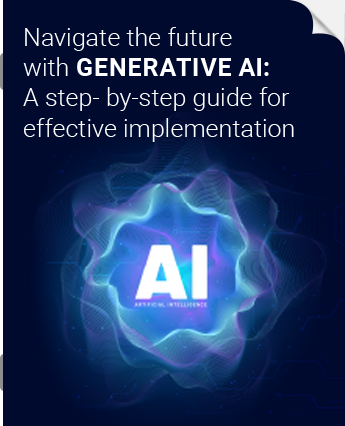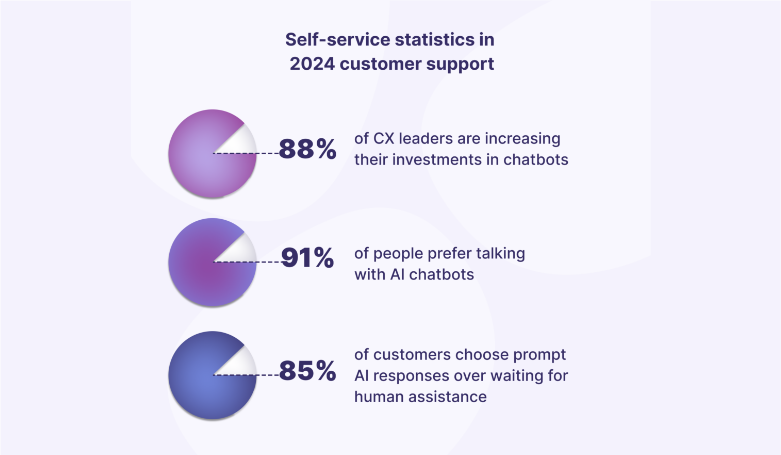Customer loyalty and trust are the most valuable currencies. To improve this, businesses need to go beyond traditional service models and embrace innovative solutions that meet and exceed customer expectations.
In this era where customer expectations are skyrocketing, the financial sector faces mounting pressure to deliver exceptional service around the clock. Traditional customer service models are not enough to handle this pressure. Generative AI offers a revolutionary solution that promises to transform customer interactions from the ground up.
Imagine a world where every customer inquiry is resolved instantly, investment advice feels like it was crafted just for you, and your financial institution anticipates your needs before you even voice them. This isn’t a vision of the distant future – it’s the reality that generative AI solutions are creating today.
Let’s explore some of the use cases of generative AI in the financial services sector for improved customer satisfaction.
Key use cases of generative AI in the financial industry

Fraud detection and prevention
In 2023, $485.6 billion were lost in total from financial scams. This not only impacts businesses’ overall operations but also hampers their reputation. Customers lose their trust in companies that can’t ensure security of their financial data.

Source: Visualcapitalist
One of the critical areas where generative AI can make a substantial impact is fraud detection and prevention. Financial fraud is a significant concern for both institutions and customers, causing a loss of billions of dollars annually and eroding customer trust. Generative AI can analyze vast amounts of transaction data in real time to identify unusual patterns and anomalies that may indicate fraudulent activity.
- Advanced pattern recognition: AI algorithms can detect subtle signs of fraud that human analysts might miss. By learning from historical data, AI models can identify emerging fraud patterns and adapt to new tactics used by fraudsters.
- Real-time monitoring: Generative AI systems can monitor transactions in real time, flagging suspicious activities immediately. This allows for swift action to prevent fraudulent transactions before they are completed.
- Enhanced security measures: By integrating AI with existing security protocols, financial institutions can strengthen their defense mechanisms, reducing the risk of fraud and enhancing overall security.

Navigate the future with generative AI: A step-by-step guide for business implementation
Discover the benefits, understand the implementation process, and follow a detailed step-by-step guide to successfully integrate generative AI into your operations.
Enhanced customer support and services
Improving customer experience should be treated as the utmost priority as it directly impacts customer loyalty, trust, and eventually the overall success of any organization. With traditional customer service models, companies often struggle to handle high volumes of inquiries promptly, leading to long wait times and customer dissatisfaction. AI-powered solutions can revolutionize this aspect by providing instant, accurate, and personalized responses.

Source: Kaizo
Generative AI-powered solutions revolutionize this aspect by providing instant, accurate, and personalized responses, making customer service more effective and efficient. Here’s how generative AI fits in:
24/7 availability
AI-driven chatbots and virtual assistants can offer round-the-clock support, ensuring that customers receive assistance whenever they need it, regardless of time zones. This constant availability enhances customer trust and reliability, as clients know they can get help at any time without delay.
Instant responses
Generative AI chatbots can handle multiple customer inquiries simultaneously, providing immediate answers to common questions and resolving issues swiftly. This capability significantly reduces wait times and enhances the overall customer experience.
Seamless escalation
For more complex issues that require human intervention, AI systems can seamlessly escalate the matter to human agents, providing them with relevant context to resolve the issue efficiently. This ensures that customers receive a smooth transition from AI to human support without needing to repeat their concerns.
Explore the transformative benefits of our generative AI framework, Needle!
Personalized financial advice and solutions
Financial institutions often face challenges such as understanding individual customer needs, managing vast amounts of data, and providing timely, relevant advice.

Source: demandsage
Personalization through AI can address these issues by offering customized investment strategies, proactive financial guidance, and enhanced client engagement. This not only helps in meeting the unique needs of each customer but also builds stronger, trust-based relationships, ultimately driving customer satisfaction and loyalty.
Generative AI services excel at delivering personalized financial advice and solutions, tailored to individual customer needs. By analyzing a customer’s financial history, behavior patterns, and market trends, AI can provide bespoke recommendations that align with their goals and risk tolerance.
Custom investment strategies
Create personalized investment portfolios based on a client’s financial goals, risk appetite, and market conditions. This ensures that each client receives investment advice that is uniquely suited to their needs.
Proactive financial guidance
By predicting future needs and opportunities, AI can offer proactive advice. For instance, if a customer is likely to need a loan based on their spending patterns, AI can suggest suitable loan products before the customer even asks.
Enhanced client engagement
Personalized advice builds stronger relationships between financial institutions and their clients. Customers are more likely to trust and remain loyal to institutions that demonstrate a deep understanding of their individual needs.
Real-time portfolio adjustments
AI algorithms can continuously monitor market conditions and individual portfolio performance, making real-time adjustments to optimize returns and manage risks. This dynamic approach ensures that portfolios are always aligned with current market realities and client objectives.
Tailored investment strategies
Generative AI can create personalized investment portfolios based on a client’s financial goals, risk tolerance, and market conditions. By considering a wide range of factors, including historical data, current market trends, and individual preferences, AI ensures that each client’s portfolio is uniquely suited to their needs.
Suggested: How legal GenAI solutions are automating contract drafting?
Benefits of generative AI in finance
Round-the-clock support
Generative AI-powered chatbots and virtual assistants provide round-the-clock support, ensuring that customers receive assistance at any time, regardless of business hours. This constant availability enhances customer trust and reliability.
- Example: Customers can get immediate help with issues like account access or transaction inquiries, even outside of regular office hours, improving their overall experience.
Seamless escalation
For complex issues requiring human intervention, AI systems can seamlessly escalate the matter to human agents, providing them with relevant context to resolve the issue efficiently. This ensures a smooth transition from AI to human support.
- Example: If a customer has a detailed question about a mortgage application, AI chatbot can gather all the necessary information and context before escalating the query to a human agent, who can then provide detailed advice and assistance.
Improved operational efficiency
AI tools like virtual assistants and intelligent bots help finance and accounting professionals perform vital operational tasks more swiftly and efficiently. This allows them to focus on more strategic, value-added tasks that support superior customer service.
- Example: AI can automate routine tasks such as data entry and report generation, freeing up human agents to concentrate on complex problem-solving and customer interactions.
Suggested: 5 tips to implement generative AI in your organization
Predictive customer insights
Generative AI helps analyze customer data to predict needs and preferences, enabling proactive customer service. This leads to higher customer satisfaction and loyalty.
- Example: By predicting future needs based on spending patterns, AI can suggest suitable financial products or services before the customer even asks, enhancing the customer experience.
Leverage generative AI for improved customer satisfaction
The adoption of generative AI in the finance industry is still at an early stage. Finance leaders and influencers must realize the potential of the technology and adopt it in their processes to offer enhanced customer service.
Financial institutions can deliver tailored investment strategies that meet individual client needs and objectives with generative AI. This not only enhances client satisfaction and loyalty but also ensures that financial institutions remain competitive in a rapidly evolving market.
Needle, our robust generative AI framework, is designed to help multiple industries, including finance, with improved customer satisfaction. The framework enables you to harness the full potential of GenAI, providing cutting-edge investment solutions and superior client outcomes. Embracing generative AI and frameworks like Needle is essential for financial institutions looking to stay ahead in the competitive market. Contact our generative AI consultants to know more.









